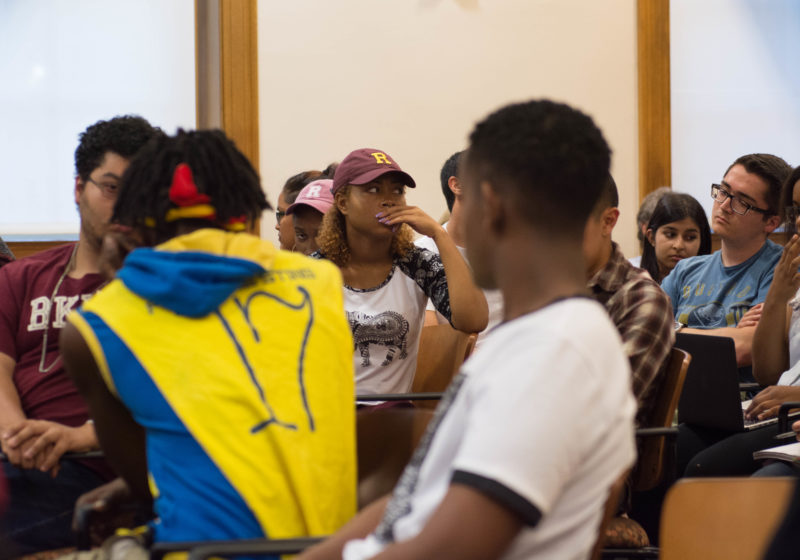Students, faculty, and staff sparred over evidence for and against arming Public Safety officers at the Medical Center, with many criticizing the data behind the University Security Commission’s recommendation, and many more rebuffing others’ anecdotes at University President Joel Seligman’s town hall meeting last Monday.
The meeting followed a week of similar town hall meetings on the Commission’s recommendation to arm 38 sworn officers at the Medical Center and four senior Public Safety officers, and was the second such meeting held on the River Campus.
It ran over time by an hour and a half as Seligman listened to the long line of attendees wishing to speak.
Some made deeply emotional appeals.
Casey Aten ’13, who returned to UR as a Public Safety officer “wanting to protect the community” she loved, remembered UR as a “welcoming, friendly community” that gave her the courage to reveal her closeted sexual identity to her parents.
“The fact that there are groups of students who don’t give a shit about my safety, and every day I come here caring about your safety is hurtful, disheartening, and extremely saddening […] I know that we can come together,” she said through tears.
UR Public Safety Officers Association President Thomas Andreano said that while many may see him as “just a uniform,” he is “just Daddy” to his two young daughters.
“I know the career I’ve chosen is a dangerous one, and I accept that,” he said. If the day comes that someone tries to end his life, though, he asked that he at least “have the chance” to defend himself.
Students countered with their own concerns.
Minority Student Advisory Board President and junior Delvin Moody argued that it’s unfair to suggest students concerned about guns on campus don’t care about the lives of Public Safety officers.
He later noted that the Commission’s recommendation does not apply to the officers fearing for their safety on the River Campus—several of whom spoke during the forum—as they would not receive guns through the proposal, as it currently stands.
Still, many students worried about how armed officers would change the campus climate, particularly with reference to race.
“Every time I look at my Facebook feed,” senior Aleem Griffiths said, “people that look like me being gunned down over and over again.”
The cops, he added, are stressful enough on their own, and arms on campus would only make that worse.
Seligman emphasized that “there should be no doubt in anyone’s mind that the principle location of fear and concern is the Medical Center.”
With the current evidence, he sees no case for arming officers on the River Campus.
Some attendees thought the recommendation for arming officers at the Medical Center was backed by unconvincing evidence, stressing the need for more data.
Physics and optics professor Joseph Eberly had the impression that “there has been a kind of rush to judgment not actually supported by many actions so far.”
He said that he could make the “rational analysis this situation requires” with local data about the number and type of confrontations resulting in lasting harm at Strong Emergency Department, as well as information about how firearms would have been helpful in those confrontations.
But, in its absence, he’s “still asking for the data.”
Modern Languages & Cultures staff member Joshua Boydston pointed out data in the Commission’s report that he found misleading, such as a list of confiscated weapons that did not clarify that it included what looked like a toy gun, as well as a BB gun and ammunition for it, shown in an associated photograph.
He criticized information cited from “Campus Safety Magazine” as especially egregious, since it included errors and the misclassification of an accidental shooting as justified.
Senior Elizana-Marie Joseph saw bias and falsehoods on both sides and suggested additional protective, preventative measures that could make UR safer.
“Public Safety deserves to be safe, but if you’re really committed to us, you have to realize you have to wait,” she said. “Because our mental, physical, spiritual, emotional, and collective safety is just as valuable.”





